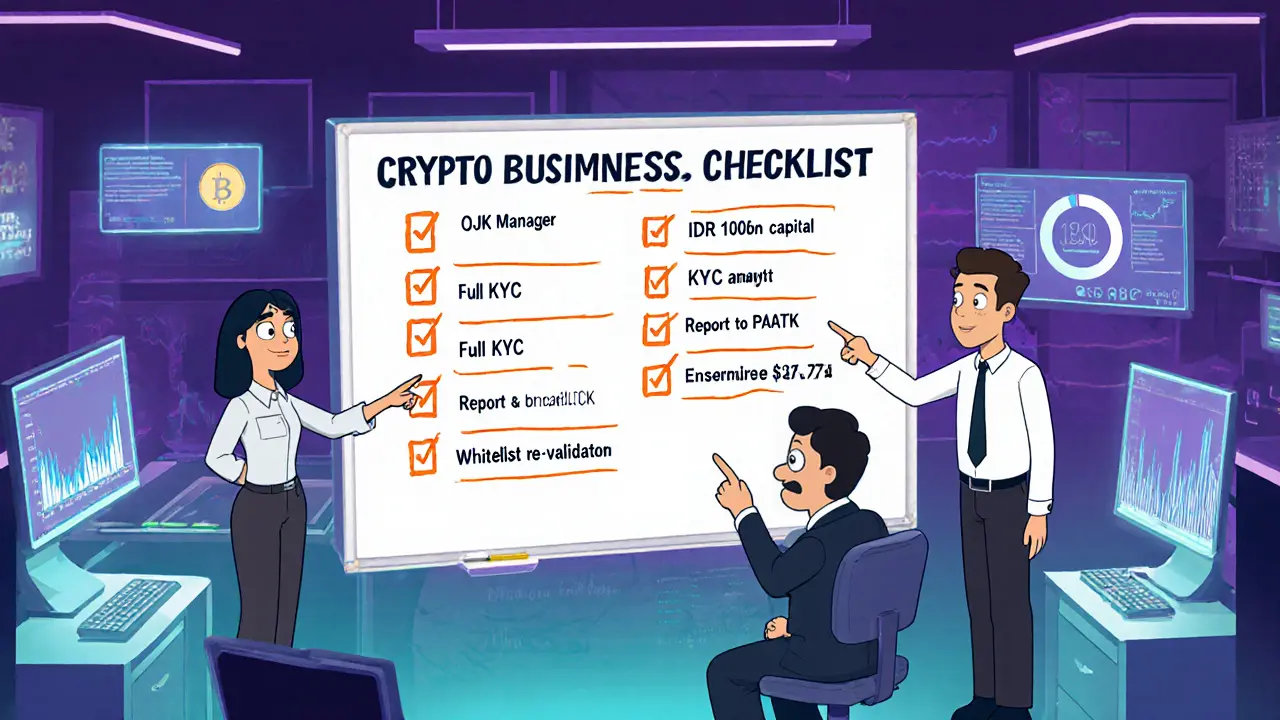Indonesia Crypto Tax Calculator
Calculate Your Crypto Tax Liability
Under Indonesia's new regulations (PMK-50, effective July 2025), crypto transactions are no longer subject to VAT. Instead, capital gains are taxed as income. This calculator compares your tax liability under the old system versus the new system.
Key Takeaways
- The 2025 shift moved crypto oversight from BAPPEBTI to OJK, recasting assets as digital financial assets.
- Trading remains legal, but using crypto for payments is still prohibited.
- New capital thresholds (IDR 100 bn paid‑up, IDR 50 bn equity) raise the bar for exchanges and traders.
- VAT no longer applies to crypto transfers after the July 2025 tax reforms (PMK 50).
- Strict AML/KYC and real‑time monitoring empower OJK, PPATK, and Bank Indonesia to enforce compliance.
What the regulatory overhaul actually means
Indonesia used to treat cryptocurrencies like any other commodity-think gold or oil-under the watch of the Commodity Futures Trading Regulatory Agency (BAPPEBTI, the agency that supervised commodity futures and later crypto trading). That arrangement let more than 850 digital tokens be listed on local exchanges, but it left a lot of gray areas around consumer protection and systemic risk.
On January 10, 2025 the oversight officially moved to the Financial Services Authority (OJK, Indonesia's regulator for banks, insurance, capital markets and now digital financial assets). The change was anchored in Law No. 4 of 2023, the PPSK Law that set the legal basis for shifting crypto regulation. In practice, OJK now classifies crypto as a “digital financial asset” (DFA), not a mere commodity.
Legal status: trading is okay, payments are not
Even with OJK’s takeover, the government has kept the ban on using crypto as a medium of exchange. The rule means you can buy, sell, and hold tokens on licensed platforms, but you cannot pay for groceries, rent, or salaries with Bitcoin or any other token. The prohibition is tied to concerns over monetary sovereignty and the lack of a central issuer.
Regulatory framework at a glance
| Aspect | Pre‑2025 (BAPPEBTI) | Post‑2025 (OJK) |
|---|---|---|
| Regulating body | BAPPEBTI (Commodity Futures Agency) | OJK (Financial Services Authority) |
| Legal classification | Commodity / Digital Asset | Digital Financial Asset |
| Capital requirement for traders | None specific, general business licence | IDR 100 bn paid‑up, IDR 50 bn equity |
| Tax treatment | VAT on delivery + income tax | No VAT on transfers; income tax on capital gains (PMK 50) |
| AML/KYC obligations | Basic AML, limited reporting | Full AML/KYC per SEOJK 20‑2024, reporting to PPATK |
| Whitelist management | Broad, self‑reported by exchanges | Re‑validation by April 2025; delist if not approved by Feb 2025 |

Key pieces of legislation and regulation
Several legal instruments stitch the new regime together:
- Law No. 4 of 2023 (PPSK Law) - provides the overarching authority for OJK to supervise crypto.
- OJK Regulation No. 27 of 2024 - outlines operational requirements for DFA traders, including licensing, capital, and AML measures.
- SEOJK No. 20 of 2024 - mandatory Know‑Your‑Customer (KYC) and suspicious‑transaction reporting guidelines.
- Government Regulation 49 (GR‑49) - officially moves the supervisory mandate from BAPPEBTI to OJK.
- Minister of Finance Regulation No. 50 of 2025 (PMK 50) - revamps tax treatment, removing VAT on crypto transfers and clarifying income‑tax obligations.
- Supporting rules from the Financial Transaction Reports and Analysis Center (PPATK, Indonesia's anti‑money‑laundering watchdog) and Bank Indonesia, the central bank that works with OJK on financial stability.
Taxation - what changed in 2025?
Before July 2025 the tax code treated crypto as an intangible commodity. That meant every trade triggered Value‑Added Tax (VAT) on the delivery of the asset, plus a final income‑tax event when the seller realized a profit. PMK 50 scrapped the VAT requirement altogether, arguing that a transfer of a digital financial asset isn’t a supply of goods or services. Instead, traders now face a straightforward income‑tax on capital gains, similar to stocks. The shift aligns Indonesia with many other jurisdictions that view crypto as a financial instrument for tax purposes.
Compliance checklist for crypto businesses
- Obtain an OJK licence for Digital Financial Asset Trading Operator (DFATO).
- Maintain minimum paid‑up capital of IDR 100 bn and equity of IDR 50 bn.
- Implement full AML program per SEOJK 20‑2024 and submit periodic reports to OJK.
- Conduct robust KYC - verify identity, source of funds, and monitor transaction patterns.
- Re‑validate your token whitelist by April 2025; delist any asset that misses the February deadline.
- Report suspicious activities to PPATK within 7 days of detection.
- Prepare for OJK’s real‑time monitoring - keep APIs ready for data sharing.

Impact on the market and industry players
Higher capital walls have already weeded out smaller, under‑capitalized exchanges. Many startups have entered joint ventures with established banks to meet the equity floor. On the upside, investors now enjoy stronger consumer‑protection safeguards and clearer legal certainty, which is attracting more foreign capital into Indonesia’s crypto ecosystem.
However, the continued ban on payments keeps the most lucrative use‑case-everyday transactions-out of reach. Industry groups are lobbying for stablecoin recognition, hoping to turn a digital token into a regulated means of payment. If that happens, we could see a second regulatory wave that re‑opens the payment‑use case while still under OJK’s watch.
Future outlook - what to watch for
Two big questions dominate the conversation:
- Will OJK eventually relax the payment ban, perhaps starting with regulated stablecoins?
- How will the collaboration between OJK, Bank Indonesia and PPATK evolve to handle cross‑border crypto flows?
Answering those will shape Indonesia’s position in Southeast Asia’s crypto landscape. For now, the 2025 reforms have made the market more orderly, but they also demand larger budgets, sophisticated compliance teams, and a willingness to adapt quickly.
Quick FAQ
Frequently Asked Questions
Is it legal to buy Bitcoin in Indonesia?
Yes. Buying, selling, and holding Bitcoin on a licensed OJK‑registered exchange is legal. Using it to pay for goods or services remains prohibited.
Do crypto exchanges need a new licence after 2025?
All exchanges that want to continue operating must obtain a Digital Financial Asset Trading Operator licence from OJK and satisfy the new capital thresholds.
How is crypto taxed under the new rules?
Transfers are no longer subject to VAT. Profits from selling crypto are taxed as capital gains according to Minister of Finance Regulation No. 50 of 2025.
What AML obligations do crypto firms face?
Firms must implement comprehensive AML programs, conduct KYC on all users, and report any suspicious transactions to PPATK within seven days.
Can stablecoins be used for payments in the future?
The government is reviewing stablecoin use. If rules are updated, they could become the first crypto‑based payment method permitted under OJK oversight.
Bottom line
Indonesia’s 2025 overhaul turned crypto from a loosely‑regulated commodity into a tightly‑supervised digital financial asset. The shift brings stronger consumer safeguards, clearer tax rules, and higher entry barriers for businesses. While the payment ban still limits everyday use, the new framework positions the country as a regional leader in structured crypto regulation. Stakeholders should watch for the next round of policy tweaks-especially around stablecoins-as those could unlock the most sought‑after use case: payments.
Marina Campenni
October 18, 2025 AT 08:30The transition to OJK's oversight certainly raises the regulatory bar, but it also offers clearer consumer protection and a more stable environment for investors.
Irish Mae Lariosa
October 19, 2025 AT 08:07The 2025 overhaul feels like a textbook case of regulatory overreach; it plugs gaps left by BAPPEBTI, yet it also creates new obstacles for smaller market participants. The capital thresholds of IDR 100 bn paid‑up and IDR 50 bn equity are immense, effectively sidelining startups that lack deep pockets. While the intention to bolster consumer safeguards is commendable, the practical effect may be a consolidation of power among a handful of bank‑backed exchanges. Moreover, the outright ban on using crypto for payments seems contradictory in a world moving toward digital cash alternatives. The removal of VAT on crypto transfers simplifies tax compliance, but it also removes a revenue stream that could fund enforcement. AML and KYC obligations are now stringent, demanding real‑time monitoring that will strain compliance teams. The requirement to re‑validate token whitelists by April 2025 adds another administrative burden, risking delistings for tokens that miss the deadline. The law’s language classifies crypto as a digital financial asset, yet the payment prohibition signals lingering skepticism from regulators. This duality may deter innovators who see the regulatory environment as a mixed signal. The increased oversight could attract foreign capital seeking certainty, but only if the market feels the rules are not punitive. In practice, many exchanges will need to form joint ventures with traditional banks to meet equity requirements, reshaping the industry landscape. The tax shift to capital gains aligns Indonesia with many jurisdictions, but the lack of clarity on how gains are calculated could lead to disputes. Overall, the reform is a step toward formalization, but the high barriers could stifle competition and slow adoption. Stakeholders must now invest heavily in compliance infrastructure, which could divert resources from product development. The future of stablecoins remains uncertain, and without payment approval, the most lucrative use‑case stays out of reach.
Nick O'Connor
October 20, 2025 AT 07:43While the criticism in the previous comment is thorough, it overlooks the fact that higher capital thresholds also ensure financial resilience, thereby protecting investors from sudden market shocks, which, in turn, could foster long‑term confidence in the sector.
Bobby Lind
October 21, 2025 AT 07:20The move to OJK certainly raises the bar, but it also brings a degree of clarity that can be very encouraging for both local and foreign participants, especially when the tax framework becomes more straightforward.
Deborah de Beurs
October 22, 2025 AT 06:57Honestly, the optimism there sounds like wishful thinking; the reality is that these “clearer” rules feel more like shackles, and the colorful jargon about "financial resilience" masks the fact that many innovators will be left on the sidelines.
Sara Stewart
October 23, 2025 AT 06:33From a compliance‑tech perspective, the mandated real‑time monitoring and AML/KYC protocols will drive a surge in API integrations, but firms must also grapple with the increased operational overhead and the need for robust data governance frameworks.
Laura Hoch
October 24, 2025 AT 06:10The philosophical angle here is that regulation, while often perceived as restrictive, can be a catalyst for maturity in a nascent market, prompting participants to elevate governance standards and align with global best practices.
Shivani Chauhan
October 25, 2025 AT 05:47Indeed, a balanced approach that blends stringent oversight with opportunities for innovation could serve Indonesia well, especially if the authorities maintain transparent guidelines throughout the implementation phase.
Vinoth Raja
October 26, 2025 AT 04:23That's a fair point, but let's not forget that the heavy compliance load might deter agile startups, which thrive on speed rather than bureaucratic rigor.
Kaitlyn Zimmerman
October 27, 2025 AT 04:00From a cultural standpoint, it’s essential that the regulatory narrative stays inclusive, providing clear pathways for both large institutions and emerging players without alienating any segment.
Ikenna Okonkwo
October 28, 2025 AT 03:37Optimistically, if the regulators keep communication open, the industry can adapt, turning these challenges into opportunities for growth and cross‑border collaboration.
Deepak Kumar
October 29, 2025 AT 03:13Stay focused, invest in robust compliance tools, and leverage the new framework as a springboard to attract institutional investors and drive market confidence.
Cecilia Cecilia
October 30, 2025 AT 02:50The new rules definitely reshape the landscape.